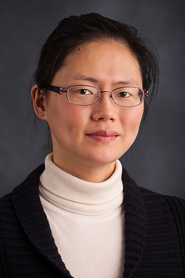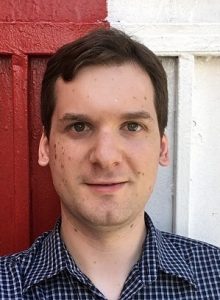FU LABORATORY
Xiaoyun Fu, Ph.D.
Research in the Fu lab focuses on disorders related to inflammation and thrombotic diseases, conditions that can be enhanced by our own immune systems. White blood cells respond to local sites of infection by releasing a host of factors capable of destroying invading pathogens and bacteria. One of the immune responses is to generate bacteria-killing oxidants which work just like bleach to “disinfect.” However, these powerful oxidants can also damage the surrounding healthy tissue, causing organ and/or blood vessel injury.
Our research uses mass spectrometry and biochemical methods to better understand the pathophysiology (abnormal functional changes) of a wide range of diseases related to inflammation and thrombosis and develop methods for prevention and new therapeutic strategies.
Areas of Study
- The oxidation, cleavage, and mutations of blood clotting proteins
- Storage lesion of blood components using metabolomics based approaches
- Clinical trials to evaluate antioxidant therapy and identify biomarkers for oxidative stress
Notable Discoveries
- NAC treatment corresponds with a decrease in protein bound cysteine in SCD and TTP patients undergoing clinical trials.
- Poly-unsaturated fatty acids and their oxidation products accumulate in both leukoreduced and non-leukoreduced red blood cell and platelet units.
- Developed an assay that incorporates mass-spectrometry and immunoprecipitation to quantitatively measure mutations, oxidation, and cleavage of VWF in the plasma of patients with clotting and bleeding disorders.
Dr Fu’s Background
- 2001-2002 Research Assistant Professor of Medicine, Washington University, St. Louis, MO
- 2002-2006 Research Assistant Professor of Medicine, University of Washington, Seattle, WA
- 2006-2008 Research Associate Professor of Medicine, University of Washington, Seattle, WA
- 2008-present Research Associate Professor, University of Washington, Division of Hematology, Seattle, WA
- 2008-2017 Associate Member, Bloodworks Research Institute, Seattle, WA
- 2017-present Full Member, Bloodworks Research Institute, Seattle, WA
Areas of Study
Research in our laboratory focuses on the role of protein oxidation and other post-translational modifications in the pathogenesis of inflammatory and thrombotic diseases by incorporating the use of mass spectrometry and analytical biochemistry. These studies encompass three primary areas:
Blood Coagulation Proteins
A major effort in our laboratory centers on the molecular mechanisms regulating blood coagulation proteins. We are currently investigating von Willebrand factor (VWF), ADAMTS13, and fibrinogen under oxidative conditions. We propose that oxidants produced by activation of inflammatory cells might modify the ability of ADAMTS13 to effectively cleave VWF. Furthermore, we are investigating the effects of fibrinogen oxidation and degradation products on its polymerization, which may play a key role in blood clotting events. These studies are in collaboration with Dr. José López at the Bloodworks Northwest Research Institute, as well as Investigators at the University of Washington. The long-term goal is to explore the functional consequences of post-translational modifications (PTMs) in blood coagulation proteins and to discover biomarkers for related diseases.
Red Blood Cell (RBC) Oxidation and Storage Lesion
It has been reported that the RBC storage lesion is associated with oxidation of the cell during storage, but very little is known about the molecular mechanisms. We are currently applying proteomic approaches to study the role of post-translational modifications to both membrane proteins and hemoglobin in the RBC storage lesion and RBCs from patients. Our long-term goal is to understand the role of specific modifications, including oxidation, phosphorylation and glycosylation, on the viability of stored and diseased red blood cells.
Oxidative Stress Markers for Clinical Trials
Oxidative stress has increasingly been associated with the pathogenesis of a wide variety of diseases including sickle cell disease (SCD) and thrombotic thrombocytopenic purpura (TTP). In collaboration with Drs. Konkle and López, we are evaluating the use of N-acetylcysteine (NAC) as an antioxidant treatment in patients suffering from SCD or TTP, and are focused on determining relevant biomarkers for measuring oxidative stress. Glutathione (GSH) has long been identified as a biomarker of oxidative stress, but it is especially difficult to quantify in plasma and there are numerous related metabolites which may also be important in evaluating oxidative stress. We have developed a liquid chromatography-mass spectrometry (LC-MS) method to quantify a panel of small-molecule thiols and disulfides, including NAC, in a variety of sample types, representing the most complete LC-MS method to date. Our method can further be used to quantify the distribution of these thiols between free and disulfide form, including those bound to protein.
Representative Publications
- Wang Y, Chen J, Ling M, López JA, Chung DW, Fu X. (2015) Hypochlorous acid generated by neutrophils inactivates ADAMTS13: an oxidative mechanism for regulating ADAMTS13 activity during inflammation. J Biol Chem 290:1422-1431. PMID:25422322
- Dayal S, Gu SX, Hutchins RD, Wilson KM, Wang Y, Fu X, Lentz SR. (2015) Deficiency of superoxide dismutase impairs protein C activation and enhances susceptibility to experimental thrombosis. Arterioscler Thromb Vasc Biol. 35:1798-804. PMID:26069236
- Yuan H, Houck KL, Tian Y, Bharadwaj U, Hull K, Zhou Z, Zhou M, Wu X, Tweardy DJ, Romo D, Fu X, Zhang Y, Zhang J, Dong JF. (2015) Piperlongumine Blocks JAK2-STAT3 to inhibit collagen-induced platelet reactivity independent of reactive oxygen species. PLoS One. 10(12):e0143964. PMID:26645674
- White NJ, Wang Y, Fu X, Cardenas JC, Martin EJ, Brophy DF, Wade CE, Wang X, St John AE, Lim EB, Stern SA, Ward KR, López JA, Chung D. (2016) Post-translational oxidative modification of fibrinogen is associated with coagulopathy after traumatic injury. Free Radic Biol Med. 96:181-9. PMID:27105953
- Chung DW, Chen J, Ling M, Fu X, Blevins T, Parsons S, Le J, Harris J, Martin TR, Konkle BA, Zheng Y, López JA. (2016) High density lipoprotein modulates thrombosis by preventing von Willebrand factor self-association and subsequent platelet adhesion. Blood. 127(5):637-45. PMID:26552698
- de Wolski K, Fu X, Dumont LJ, Roback JD, Waterman H, Odem-Davis K, Howie HL, Zimring JC. (2016) Metabolic pathways that correlate with post-transfusion circulation of stored murine red blood cells. Haematologica. 101(5):578-86. PMID:26921359
- Zimring JC, Slichter S, Odem-Davis K, Felcyn JR, Kapp LM, Bell LN, Gunst PR, Corson J, Jones MK, Pellham E, Bailey SL, Fu X. (2016) Metabolites in stored platelets associated with platelet recoveries and survivals. 56(8):1974-83. PMID:27158944
- Fu X, Felcyn JR, Odem-Davis K, Zimring JC. (2016) Bioactive lipids accumulate in stored red blood cells despite leukoreduction: a targeted metabolomics study. Transfusion. 56(10):2560-70. PMID:27514704
- Karafin MS, Fu X, D’Alessandro A, Thomas T, Hod EA, Zimring JC, Field JJ, Francis RO. (2018) The clinical impact of glucose-6-phosphate dehydrogenase deficiency in patients with sickle cell disease. Curr Opin Hematol. 25(6):494-499 PMID:30239377
- Stone M, Keating SM, Kanias T, Lanteri MC, Lebedeva M, Sinchar D, Hampton D, Jakub A, Rychka V, Brewer G, Bakkour S, Gefter N, Murcia K, Page GP, Endres-Dighe S, Bialkowski W, Fu X, Zimring J, Raife TJ, Kleinman S, Gladwin MT, Busch MP. (2019) Recipient Epidemiology Donor Evaluation Study III (REDS-III) Program: Piloting and implementation of quality assessment and quality control procedures in RBC-Omics: a large multi-center study of red blood cell hemolysis during storage. Transfusion. 59(1):57-66. PMID:30566231
- D’Alessandro A, Culp-Hill R, Reisz JA, Anderson M, Fu X, Nemkov T, Gehrke S, Zheng C, Kanias T, Guo Y, Page G, Gladwin MT, Kleinman S, Lanteri M, Stone M, Busch M, Zimring JC. (2019) Heterogeneity of blood processing and storage additives in different centers impacts stored red blood cell metabolism as much as storage time: lessons from REDS-III-Omics. Transfusion. 59(1):89-100. PMID:30353560
- Fu X, Cate SA, Dominguez M, Osborn W, Özpolat T, , Konkle BA, Chen J, and López JA. (2019) Cysteine disulfides (Cys-ss-X) as sensitive plasma biomarkers of oxidative stress. Scientific Reports. 9(1):115. PMID:30643157
- Francis RO, Mahajan S, Rapido F, La Carpia F, Soffing M, Divgi C, Yeh R, Mintz A, Leslie L, Agrest I, Karafin MS, Ginzburg Y, Shaz BH, Spitalnik SL, Schwartz J, Thomas T, Fu X, Amireault P, Buffet P,Zimring JC, D’Alessandro A, Hod EA. (2019) Reexamination of the chromium-51-labeled posttransfusion red blood cell recovery method. Transfusion. 59(7):2264-2275. PMID:31002399
- Fu X, Anderson M, Wang Y, Zimring JC. (2019) LC-MS/MS-MRM-based targeted metabolomics for quantitative analysis of polyunsaturated fatty acids and oxylipins. Methods Mol Biol. 1978:107-120. PMID:31119659
- Howie HL, Hay AM, de Wolski K, Waterman H, Lebedev J, Fu X, Culp-Hill R, D’Alessandro A, Gorham JD, Ranson MS, Roback JD, Thomson PC, Zimring JC. (2019) Differences in Steap3 expression are a mechanism of genetic variation of RBC storage and oxidative damage in mice. Blood Adv. 13;3(15):2272-2285. PMID:31350307
Fu Laboratory Members
 |
Yi Wang, Ph.D. Research Scientist Email: [email protected] Phone: (206) 568-2243 FAX: (206) 587-6056 |
 |
Warren Osborn Research Technologist II E-mail: [email protected] Phone: (206) 568-2239 |
 |
Yu Shen Research Technologist I E-mail: [email protected] Phone: (206) 568-2258 |

Xiaoyun Fu, Ph.D.
Full Member
Director of Mass Spectrometry Laboratory
Research Associate Professor
Division of Hematology
University of Washington School of Medicine
Bloodworks Northwest
Research Institute
1551 Eastlake Avenue E, Suite 100
Seattle, WA 98102
Email: [email protected]
UW Mailstop 359190
Phone: (206) 568-2250
FAX: (206) 587-6056
Tena Petersen
Senior Administrative Coordinator
Email: [email protected]
Phone: (206) 568-2246
Fax: (206) 587-6056


